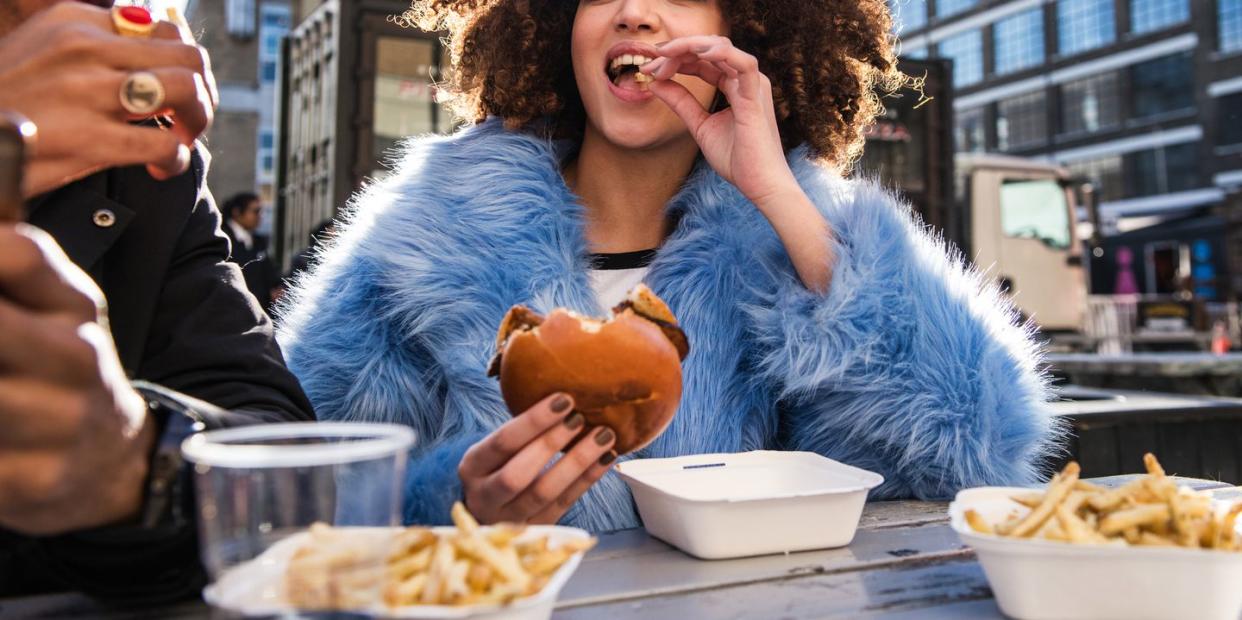Intuitive Eating Is The Diet That Tells You To Abandon All Other Diets

Goodness knows you've read about dozens of diets over the years, all of which claim they'll change your life and eating behaviors forever. The newest of these diets separates itself from the pack by not being a "diet" at all—intuitive eating is endorsed by dietitians as a non-restrictive approach to food. It's becoming more and more popular as major influencers pick it up (of course!). Here's what you need to know about the method.
What is intuitive eating?
According to Alissa Rumsey, RD (who just so happens to be the woman behind #WomenEatingFood), intuitive eating is "a non-diet approach to health and wellness that helps you tune into your body signals, break the cycle of chronic dieting and heal your relationship with food."
Rather than looking at certain foods as "good" or "bad" and eating based off that mentality, the approach focuses on your behaviors and staying in tune with your body as the pillars for what should drive your food choices. Basically, intuitive eating recommends you eat whenever you're hungry and stop whenever you're full. That's it!
Where did it come from?
The Atlantic reports intuitive eating was the 1995 brainchild of California registered dietitians Evelyn Tribole and Elyse Resch. They'd watched clients gain weight and lose weight over and over again, all while feeling helpless because people's behaviors wouldn't change and they'd begin disordered and emotionally fraught eating habits in the process. Et voila: intuitive eating.
A post shared by Olivia, M.S., CF-SLP (@olive.eeeats) on Jul 10, 2019 at 8:33am PDT
What are the actual tenets of intuitive eating?
So glad you asked! There are 10 of them. Per IntuitiveEating.Org, those principles are:
Reject the diet mentality: Stop adhering to anything you've read or heard that discourages you from eating a certain way.
Honor your hunger: Hunger is normal and healthy. It's not something to achieve or be ashamed of.
Make peace with food: Reject the notion that any food is "good" or "bad" or something you "shouldn't" or "can't" eat. Love all the foods you love!
Challenge the food police: When you find yourself categorizing foods as any of the above, don't let those thoughts overwhelm you or sway your food decision-making.
Feel your fullness: Your body will tell you when it's full. Be cognizant of that!
Discover the satisfaction factor: If you're not satisfied with what you ate, you'll likely just continue eating. Eat what you want and you will be happy!
Cope with your emotions without using any food: When you're sad, cope without food. When you're anxious, cope without food, when you're—you get it.
Respect your body: It's hard to not be critical of how you look, but there are so many things about your appearance you can't control. Don't even try!
Exercise and feel the difference: Self-explanatory.
Honor your health with gentle nutrition: Again, don't categorize foods in any kind of way. Just be sure to take note of how certain foods make you feel and eat what feels good.
A post shared by Dietitian | Keswick & Uxbridge (@tasteofjulia) on Jul 11, 2019 at 7:31am PDT
Does it work?
There is some literature to prove it does. This study from the National Center for Biotechnology Information found intuitive eating to be "positively associated with various psychological health indicators, and possibly positively associated with improved dietary intake and/or eating behaviors." That said, it also found it was "not associated with higher levels of physical activity" and that it's "negatively associated with BMI."
Who is actually doing it?
The Instagrammers, you guys! Olive.eeeats, theflexiblefoodie, the_bananadiaries, and shuangys_kitchensink are among some of the most prominent influencers doing it, but there are tons more. Check out the 1+ million posts with the hashtag #intuitiveeating.
('You Might Also Like',)

